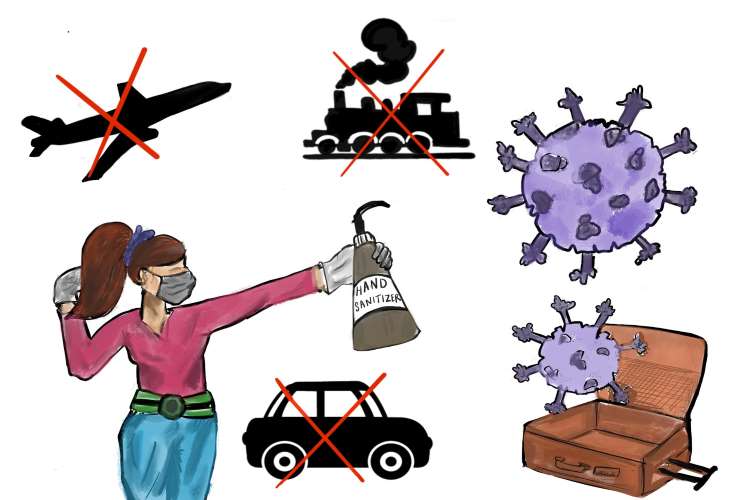Badri Narayanan Gopalakrishnan and Anushka Mehta
The Covid-19 pandemic had a devastating effect on the global tourism industry. The World Tourism Organisation estimates a loss of 850 million to 1.1 billion international tourist arrivals, $910 billion to $1.1 trillion in export revenues and 100-120 million jobs globally. The most severe global health emergency since the Spanish Flu outbreak of 1918 and the subsequent lockdown have brought the tourism industry to a grinding halt. Recreational activities are expected to witness up to 60% losses. The travel bans, border closings, and uncertainties about the future have pushed a large number of companies into bankruptcy, putting millions of tourism jobs at risk.
The global tourism industry has shown great potential for further advancement in fields such as food, transportation, accommodation and entertainment. It has used the development of new infrastructure and technologies to attract tourists. Tourism has continuously generated jobs and alternative incomes in India and helped boost the country’s GDP through high profit ventures. A large population depends on labour-intensive industries to emerge from the clutches of poverty. The local spending on many items such as food and entertainment has helped boost the economy in a number of ways. The cultural diversification and expansion have sustained many artisans and small-scale industries in times of crisis, but this did not happen during the coronavirus outbreak.
With more than 10 million foreign tourist arrivals in 2019, the stakes are very high in 2020. But the year saw enterprises incurring huge losses. A two-thirds fall in global tourist arrivals may lead to a 2-3% decrease in employment opportunities for low-skill workers across the country, according to our analysis using a global economic model created by UNCTAD.
The lack of consumption demand and a fall in earnings have left many food businesses in tatters. Debt burden and layoffs have risen due to high fixed costs. Business owners are forced to use their own personal savings to keep their businesses afloat and may shut down with drying cashflows. Instances of the employees and delivery workers being infected with COVID-19 have further affected their business.
With barely any flights operating, the aviation industry is in dire need of financial support and restoration of normal operations. An industry that had been the third largest and fastest growing industry in terms of domestic ticket sales is now in a spot of bother. The aviation industry contributes about $72 billion to India’s GDP and provides a large number of jobs. The pandemic has seen the number of flights falling by 80% worldwide due to lack of occupancy. The industry is bleeding due to high maintenance costs, parking charges, excise duties, high fuel prices and operating costs.
The hotel industry has been a large source of employment, but it is now facing harsh conditions due to the pandemic. Under government orders, hotels have been converted into quarantine facilities. This order for requisitioning hotels has been controversial as hotels are not equipped to handle such situations and are still recovering from falling profits.
Technology has changed the world in an unprecedented way. The COVID-stricken tourism industry is relying on virtual tours to keep the tourists interested. The ministry of tourism has launched a DekhoApnaDesh series of webinars featuring different places in India and providing a variety of virtual experiences such as “trekking the Himalayas.” Augmented and virtual reality experiences will define the future of the stay at home world. Enhancement of travel technology is expected to ensure passenger safety by reducing human contact.
The pandemic and the shutdown have destroyed livelihoods and businesses in all sectors of the economy, and resilience is needed to revive this sector. Absence of vaccines and proven remedies makes it imperative to have constraints on human mobility for an extended period. Cuts in taxes, fees, and provisions of income support should be made by the government. Incentives should be given to retain staff and to keep this industry afloat. With an estimated global GDP loss of $3 trillion from tourism sector, all these measures should be rolled out to secure the future of tourism industry.
(Badri Narayanan Gopalakrishnan is founder, Infinite Sum Modelling LLC, Seattle. Anushka Mehta is currently interning with Infinite Sum Modelling.)
This article was originally published in policycircle.org

